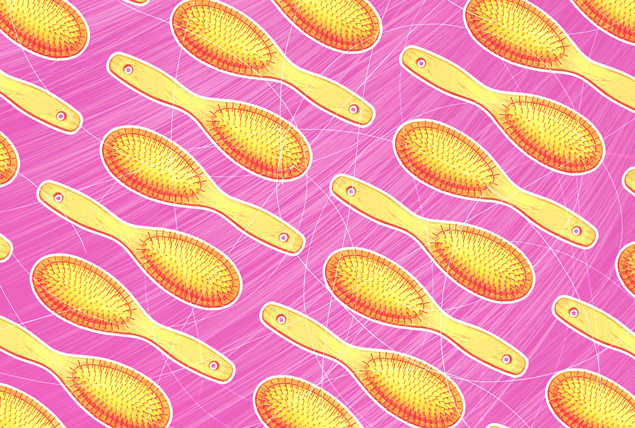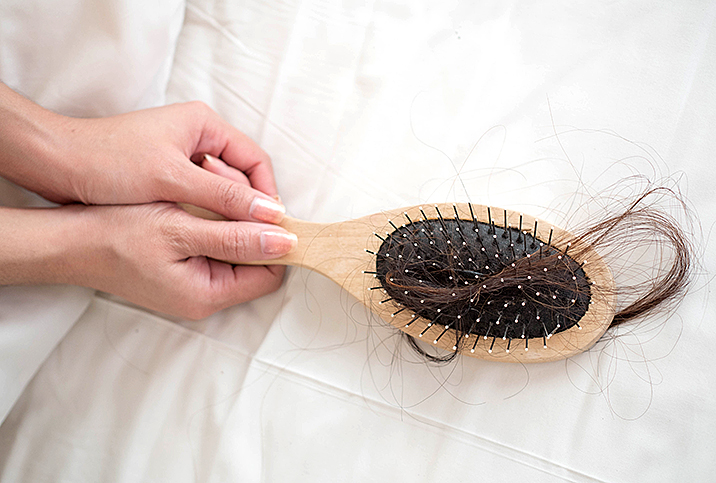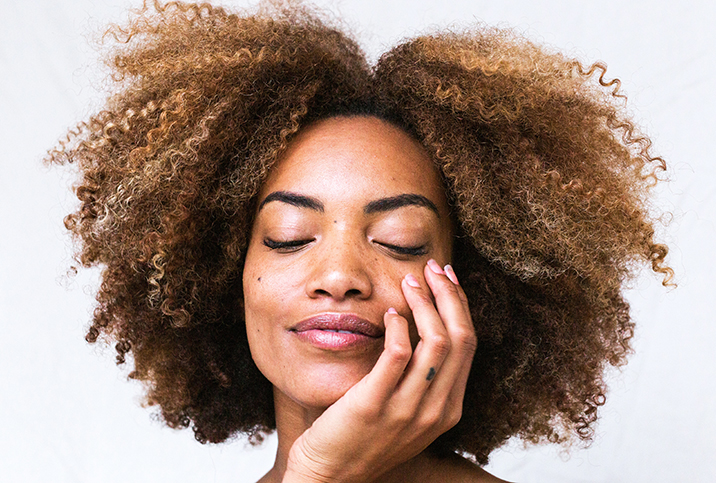Why Women Lose Their Hair and What You Can Do About Hair Loss

What's a woman with hair loss supposed to do? It's difficult to listen to a podcast or scroll through social media without being targeted with a hair growth pill, serum or shampoo ad. Do those magic products actually work?
Why do women lose their hair when it isn't related to postpartum hair loss and what do doctors and experts suggest we do about it?
Is it common for women to lose their hair as they age?
Nearly 50 percent of women will experience hair loss, according to Cleveland Clinic. The most common type of hair loss in women is female pattern hair loss (FPHL). Unlike male pattern balding, which tends to affect the top of the head, FPHL involves a thinning of the hair overall but keeps the typical hairline.
Female pattern hair loss affects 40 percent of women by age 50, a 2015 study suggested. That percentage rises with age.
Hair shedding, which can be caused by a number of things from stress, medications, postpartum, poor diet, surgery and health conditions.
Two-thirds of postmenopausal women will experience bald spots or thinning hair, according to Harvard Health. It's not uncommon, but it's also not often discussed.
Women tend to conceal this loss more than men, due to the stigma around open displays of female hair loss, said Tiffany Young, a trichologist and the CEO of Thin Hair Thick in Salt Lake City.
What are the common causes of hair fall?
"The two main causes for hair loss in adult women are shedding (telogen effluvium) and [when] the hair stops growing (androgenetic alopecia)," said Sandra Marchese Johnson M.D., F.A.A.D., the owner of Johnson Dermatology in Fort Smith, Arkansas.
"Telogen effluvium (TE) is a fancy medical term for increased hair shedding, which can be caused by a number of things from stress, medications, postpartum, poor diet, surgery and health conditions," said Diana Gallerani, M.S.N., F.N.P.-C., a board-certified nurse practitioner and the founder of DG Medical Aesthetics, just outside Boston.
She has recently seen a lot of post-COVID hair loss.
"Typically when we see TE, we are looking back in time to what happened three months ago," Gallerani said. "The way hair cycles and grows, it can take that long for the shedding to start."
We shed hair in different stages of our hair cycle, but after stress, a larger percentage than usual of hair will fall out. One dermatologist said there's good news, though.
"This kind of hair loss is reversible; it does grow back," said Hadley King, M.D., F.A.A.D., who practices medical and cosmetic dermatology in New York City.
What are the different kinds of alopecia?
Androgenic alopecia (AGA) is the most common type of hair loss.
"[It is characterized by] miniaturization or thinning in the diameter of the hair resulting in an increase in the amount of scalp showing through the hair," Gallerani said.
Your hair stops growing with AGA.
"Your body stops giving the signals to your hair to grow and the environment in your scalp changes with age or hormonal status," Johnson said.
"[AGA is] related to our hormones and the sensitivity of the hair follicles to the hormones, which is primarily genetically determined," King said. "Therefore, hormonal prescription medications such as some oral contraceptives and spironolactone can be very effective in making the scalp hair thicker. Over-the-counter minoxidil is also effective for some women."
Speak to your doctor to determine which birth control pills are right for you.
Another hair and scalp condition is alopecia areata, not to be confused with AGA. While this type of alopecia is the best-known kind of hair loss, it is actually the least common type of hair loss for women, according to Gallerani. It usually presents as classic coin-shaped, hairless lesions and can develop into larger areas and even affect the entire scalp.
Another form of alopecia is traction alopecia, which can happen when tight hairstyles pull on the hair follicles and damage them, eventually causing hair loss and scarring of the follicles, according to King.
How do you treat hair loss in women?
Unfortunately, no magic pill will make your hair grow back overnight. Nor is there a one-size-fits-all fix. Different types of hair loss and alopecia are treated differently. A specialist can work with you on a treatment.
"An appropriate diagnosis is critical to understand the cause and begin the appropriate medical treatment," said Christine Shaver, M.D., a board-certified dermatologist at Bernstein Medical Center for Hair Restoration in New York City. "Please visit a board-certified dermatologist if you are in doubt about what type of alopecia you are experiencing so that you can be guided to the most appropriate intervention and receive the most effective treatment."
Don't allow the internet to point you to flashy trends that don't work, she added. Some of those trends may even be harmful.
How can you help prevent further hair loss?
You should see a dermatologist to get your hair loss diagnosis and treatment, but you can try a few things at home that might help you stop losing your hair. One thing you can do is turn down the heat on your hot tools. Minimizing heat styling can prevent hair loss, King suggested.
You should never set these tools above 350 degrees. Why?
"The higher temps on your iron are for professional use, such as keratin straightening or heat treatments, and is not meant for daily use," said Lisa Abbey, a professional hairstylist and the founder and CEO of Strength x Beauty, a Long Island, New York-based hair product line for people with fine and thinning hair.
What hair care products should you avoid to help keep your hair healthy?
Washing your hair doesn't cause hair loss, but the products you're washing your hair with might contribute to further hair fall.
"The idea that frequent washing or brushing one's hair causes hair loss is blatantly false," Shaver stressed.
You'll want to avoid any products that can dehydrate your hair, such as shampoos with sulfates or alcohol-based hair sprays.
"Glycerin-based styling products are good for keeping the hair hydrated," King said.
Beware of any serums and shampoos marketed at preventing hair loss.
"Few [of them] have proven scientific benefits," Shaver said. "It is important to inspect the data behind a product, rather than become trapped by flashy marketing campaigns."
While you're washing your hair, make sure you wash it well.
Washing your hair every other day is a good general rule of thumb, according to Gallerani, because you need to cleanse the scalp and remove the dead skin cells, oil and product build-up.
"It can even be helpful to brush the scalp and hair prior to washing it to break up all the dead skin cells and product buildup and to distribute your scalp’s natural oil," she added.
Are hair loss pills and serums effective hair loss treatments?
"Unfortunately, there are many scam products advertised for hair loss that should be avoided. Almost all hair loss pills and serums do not have adequate scientific data to support their claims," Shaver said.
If it sounds too good to be true, it probably is.
"Targeted campaigns through TikTok and Instagram purposely send you flashy advertisements that you may be interested in based on your recent internet searches," she added.
This is why when you're searching for a hair loss remedy, you want to weed out any products whose claims can't be backed up by a clinical trial. Or ask your doctor about the product's efficacy.
"The one exception is over-the-counter (OTC) products that contain minoxidil. It is the active ingredient of Rogaine and has been proven to promote hair growth," Shaver said. "Using OTC generic minoxidil is the most cost-effective way to benefit from the medication."
"Minoxidil is the most proven OTC option for both men and women, as it's a potassium channel opener that causes hyperpolarization of cell membranes, widening blood vessels and opening potassium channels, allowing more oxygen, blood and nutrients to reach the hair follicles," King said.
Can supplemental vitamins restore hair growth?
Vitamins should be taken when there is a vitamin deficiency, such as during heavy menstruation when you might lose iron, which can lead to slow hair growth.
"Products that contain both high doses of vitamins and antioxidants have not been proven to promote hair growth. Just blanketly taking extra vitamins may do more harm than good, as some in excess––such as vitamin A––can actually lead to hair loss," Shaver said.
"If your hair growth cycle is constantly challenged—for example, by metabolic imbalances, illness or improper nutrition—you may find that your hair does not grow as long as it used to. This is because your hairs aren't allowed to stay in anagen phase long enough to reach the full length," King said.
You can remedy this by having a well-rounded diet with at least 65 grams of protein per day. How will that help?
"Your hair is made up of protein, so not eating enough can have a big impact," Gallerani said.
Does the TikTok rosemary hair growth hack work?
Rosemary has become a TikTok favorite hack for hair growth. It's not a myth or a magic bullet.
"Rosemary can stimulate hair growth, but it is slow and might not work for everyone. Furthermore, some people have a sensitivity to any type of oil left on the scalp and they can find that it increases their hair shedding," Young said.
Massaging rosemary oil into the scalp showed comparable hair growth to using 2 percent Minoxidil— it is typically recommended in 5 percent doses—a 2015 study suggested.
"Rosemary oil could be a good supplement as part of a more aggressive treatment plan, or a preventive measure for women genetically predisposed to hair loss," Gallerani said.
However, rosemary doesn't have enough scientific data to support its effectiveness in treating hair loss.
"Once fully randomized and controlled trials that gather scientific data have been performed, then more doctors can comment on efficacy," Shaver said.
More research is needed to determine the effectiveness of rosemary on hair loss.
Why do I need to see my doctor about my hair loss?
"The best way for a woman to prevent hair loss is to get an accurate diagnosis of its cause, as the various treatments are often cause-specific," Shaver said. "For example, genetic thinning in women is often medically treated with minoxidil or PRP, while alopecia areata, a form of autoimmune hair loss, is treated with topical or injectable steroids to stop the attack of follicles."
Different types of hair loss or a receding hairline require different treatments.
"Inflammatory hair loss also often requires steroid medications to calm down the inflammation and prevent progression, which can lead to scarring if left untreated. Some general hair/scalp care that everyone can benefit from to prevent hair loss includes avoiding tight hairstyles or trauma to the scalp," Shaver said.
"Most people do not lose their hair overnight: The loss tends to be slow and gradual in most cases, which mirrors the timeline for how it comes back. Most patients need lifelong treatment for hair loss to increase or maintain results, so that is definitely something to consider when starting a treatment plan," Gallerani said.
The bottom line
It can be upsetting for anyone to lose their hair or develop hair thinning. For women experiencing female pattern baldness or other hair loss, it can feel devastating. Speak with your doctor to learn what kind of treatment options are available for you.


















